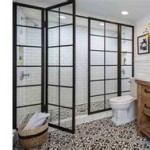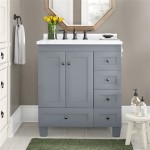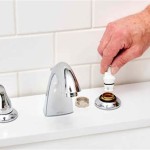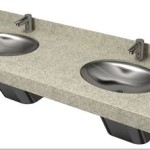Is It Okay To Use Vinyl Flooring In The Bathroom?
When considering flooring options for your bathroom, vinyl flooring may come to mind. Its durability, affordability, and design versatility make it a popular choice for many homeowners. But does it hold up against the unique challenges of a bathroom environment? While vinyl flooring has its pros and cons, it can be a suitable flooring option for bathrooms, provided certain factors are considered.
Durability and Water Resistance
Vinyl flooring boasts excellent durability and water resistance. It's made from a synthetic material that's designed to withstand heavy foot traffic, moisture, and even spills. However, it's important to differentiate between regular vinyl flooring and luxury vinyl tile (LVT) or luxury vinyl plank (LVP). Regular vinyl flooring, often referred to as sheet vinyl, is typically glued down and can be more susceptible to warping or delamination if exposed to excessive moisture. LVT and LVP, on the other hand, come in individual tiles or planks that can be installed over a moisture-resistant underlayment, offering better protection against water damage.
In addition, vinyl flooring is relatively easy to clean, making it a practical choice for bathrooms where spills and splashes are inevitable. A simple mop and mild cleaner are usually sufficient for maintaining its shine.
Aesthetic Appeal and Versatility
Vinyl flooring has come a long way in terms of design and aesthetics. It's no longer just a plain, utilitarian option. Modern vinyl flooring comes in a wide array of colors, patterns, and textures, mimicking the look of wood, stone, ceramic tiles, and even intricate designs. This versatility allows you to create a bathroom that reflects your personal style and complements your existing décor.
Furthermore, vinyl flooring can be used to create seamless transitions between rooms, as it is readily available in different sizes and shapes. It can be installed in various bathroom styles, from modern to classic and everything in between.
Considerations and Limitations
Despite its advantages, vinyl flooring does have certain limitations. It's generally not as durable as natural stone or porcelain tiles, and it can be prone to scratches and dents if subjected to heavy impacts. While it's waterproof, it's not impervious to water. Moisture can seep in through the seams or under the edges of the floor if the installation is not properly sealed. Additionally, while vinyl flooring is generally affordable, high-quality LVT or LVP can be more expensive compared to other budget-friendly options.
It's also crucial to consider the specific needs and preferences of the bathroom. If the bathroom is used frequently and receives heavy foot traffic, a more durable flooring option may be preferred. Similarly, if the bathroom is prone to flooding or leaks, a waterproof flooring material like ceramic tile would be a better choice.
Conclusion
Vinyl flooring offers several benefits for bathroom spaces. Its durability, moisture resistance, and aesthetic appeal make it a viable option for many homeowners. However, it's essential to carefully consider the specific requirements and limitations of the bathroom and the different types of vinyl flooring available before making a decision.

Vinyl Planks In Bathrooms Residential Inspiration Flooring

Can You Renovate Bathrooms With Vinyl Flooring Imagine Floors

Can Vinyl Flooring Be Used In A Bathroom Hallmark Floors

7 Benefits Of Bathroom Vinyl Flooring Victorian Plumbing

Luxury Vinyl Flooring Is A Great Choice For Chic Bathrooms

Best Vinyl Flooring For Bathrooms

What Is The Best Flooring For Bathrooms Tarkett

Dos And Don Ts For Installing Vinyl Plank Floors In The Bathroom Advice Homeowners

Best Bathroom Flooring Options

12 Things You Should Know About Luxury Vinyl Tile Floor Coverings International
Related Posts







